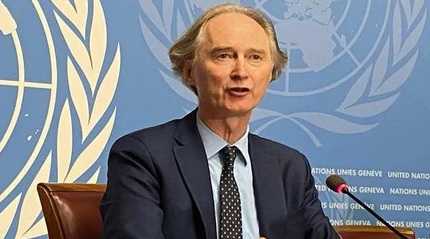
17 Jan 2022; MEMO: The United Nations' Special Envoy to Syria has dismissed the need for regime change in Syria and said that the country is stable under President Bashar Al-Assad, seeming to confirm fears by many that the UN is in favour of cooperating with Assad.
Geir Pedersen made the comments in a meeting with Iranian Foreign Minister, Hossein Amir Abdollahian, yesterday during his visit to Iran, in which the two discussed the ongoing situation in Syria and the path towards a political solution.
According to the Tehran Times newspaper, the UN Envoy told Abdollahian that Syria is currently stable and that no party is discussing or considering regime change in the country. He also insisted on the necessity of maintaining Syria's national sovereignty, political stability and its territorial integrity.
Pedersen cited the presidential elections in May last year – in which Assad allegedly won a staggering 95 per cent of the vote – as a prime example that Syria is experiencing a period of peace after a decade of conflict.
Although the UN has never directly supported Assad or advocated against regime change, the Envoy's comments are likely to result in outrage and backlash from Syrian dissidents and human rights activists who have long expressed dismay that the UN and the international community holds talks with the Assad regime and treats it as the sovereign authority in Syria.
Throughout the ongoing peace process, however, the UN has maintained that the regime must be talked to and negotiated with as a prime player in the country if a political solution is to come about.
Pedersen's comments also represent a major shift in the narrative around the Syrian regime's general legitimacy, with many in the Middle East restoring ties with Assad after a decade.
It marks a significant contrast to the predictions that the United States and other Western nations would attempt to overthrow Assad and implement a policy of regime change in Syria, a view which became widespread after the Assad regime's brutal crackdown on peaceful protestors at the start of the Syrian revolution 2011.
The statement that Syria is safe is also contested, with human rights abuses continuing to be regularly committed by the regime security forces and intelligence services despite the fighting mostly having died down and the majority of territory having been recaptured by Assad.
It comes amid growing concerns regarding the UN's relationship with Assad and its stance on refugees' return, particularly in September when the UN was accused of attempting to forcibly return Syrian refugees in the Rukban camp to regime-held territory, which it denied.




